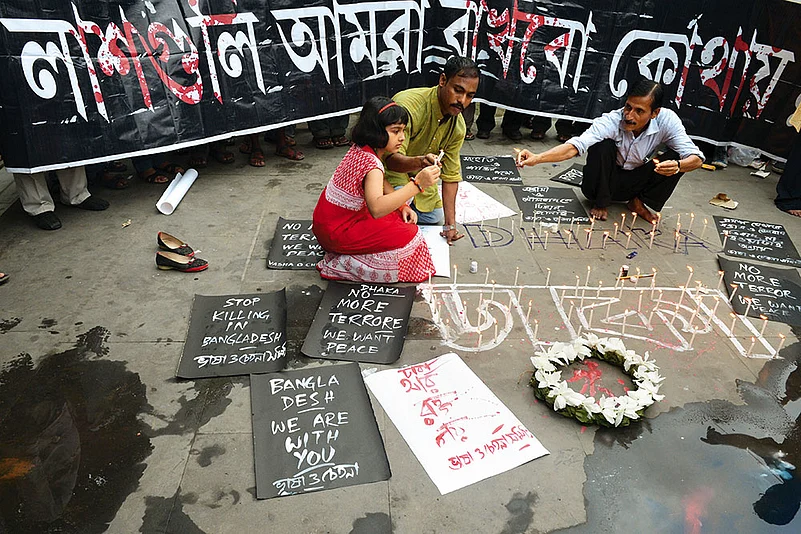An overwhelming majority had fought Pakistani hegemony to become Bangladesh. But a powerful minority had not—say about 30 per cent. This minority, consisting of elements in the army, police, civil service, Islamic groups like the Jamaat-e-Islami, clustered around spells of army rule and has now thrown its lot with Begum Khaleda Zia, leader of the Bangladesh Nationalist Party (BNP). Prime Minister Sheikh Hasina of the Awami League is emotionally (and politically) more inclined towards India. Begum Zia correspondingly leans towards Pakistan. This is the backdrop.
In mid-April some friends invited us to participate in the Poila Boishakh festivities in Dhaka. I have never seen the Indian new year celebrated on an epic scale as it is in Bangladesh. Ramana Park, the vast maidan in the heart of Dhaka, hosted a colourful carnival. Groups of women, in elegant sarees, bindis on their foreheads, sang Rabindrasangeet, Nazrulgiti, and, for variety, more contemporary songs in Bengali to the accompaniment of a rock band. But this is one facet. The previous day, clerics affiliated to the Jamaat had issued a ‘fatwa’, declaring Baisakh festivities as ‘haram’, or impure.
The basic conflict in Bangladesh is between modernism and Islamism. Contrary to one’s expectations, all modernists are not lined up behind Sheikh Hasina. A large segment is disenchanted with her poor governance and increasing intolerance. But this lot, tested in the 1971 civil war, will never support intolerant Islamism. Recently, Mahfuz Anam, the editor of the Daily Star, had 84 cases slapped against him by the Awami League because the PM was cross with him. For the 25th anniversary of his newspaper, he invited Nobel laureate Muhammad Yunus, who was once expected to join politics and challenge the two begums. His presence at the event was seen as the start of a conspiracy.
Soon upon my return, I received news that Prof Rezaul Karim Siddique had been hacked to death. His contribution to Rajshahi University’s literary life was immense. Soon, the rampant culture of impunity claimed its next victim—Xulhaz Mannan, editor of a gay magazine, and then more. The climax was the bloodbath at the restaurant in Dhaka’s elite Gulshan neighbourhood, followed up by a bomb blast on Eid. In two years, 51 people, including 20 foreigners, have been killed.
Sheikh Hasina blames it all on the opposition combine—the BNP and the Jammat. The Jamaat is livid with Hasina for the hanging of its chief Motiur Rehman Nizami for his role in the war crimes in 1971.
Since India-Bangladesh relations have seldom been better, there is considerable willingness among her advisers to blame Pakistan for attempts to destabilise her.
A Bangladeshi editor drew my attention to an interview by ISIS’s official magazine, Dabiq. The interviewee is Sheikh Abu Ibrahim al-Hanif, the ‘Amir of ISIS soldiers in Bengal’. He strongly chastises the Jamaat, the object of Hasina’s ire: “Jamaat is a political party that has long committed acts of kufr (sin) and shirk (deviant behaviour). Firstly, it supports and calls the Muslims of Bengal to the religion of democracy.... Democracy is a religion that believes in giving people the power to legislate and make things halal or haram, whereas that is the right of Allah alone."
Hasina is adamant: Jamaat and Pakistan are out to destabilise her. But a voice informs the unverifiable ISIS mouthpiece that the Jamaat is the devil incarnate.
Place these contradictions in the cauldron, and you end up with vapours of confusion. But I am willing to wager a bet: a nation which sacrificed millions of lives to win the right to celebrate Poila Boishakh is not going to be brought to its knees easily. I am less certain about the political longevity of the two incorrigible ladies.
(Veteran journalaist Saeed Naqvi’s book Being the Other: The Muslim in India has just been published)
Slide Show
Mahfuz Anam is the father of novelist Tahmima Anam, whose trilogy (the latest of which is The Bones of Grace) has as its backcloth Bangladesh’s bloody birth and its subsequent struggle with identity.
























